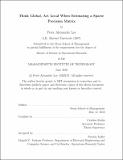Think global, act local when estimating a sparse precision matrix
Author(s)
Lee, Peter Alexander
DownloadFull printable version (3.149Mb)
Other Contributors
Massachusetts Institute of Technology. Operations Research Center.
Advisor
Cynthia Rudin.
Terms of use
Metadata
Show full item recordAbstract
Substantial progress has been made in the estimation of sparse high dimensional precision matrices from scant datasets. This is important because precision matrices underpin common tasks such as regression, discriminant analysis, and portfolio optimization. However, few good algorithms for this task exist outside the space of L1 penalized optimization approaches like GLASSO. This thesis introduces LGM, a new algorithm for the estimation of sparse high dimensional precision matrices. Using the framework of probabilistic graphical models, the algorithm performs robust covariance estimation to generate potentials for small cliques and fuses the local structures to form a sparse yet globally robust model of the entire distribution. Identification of appropriate local structures is done through stochastic discrete optimization. The algorithm is implemented in Matlab and benchmarked against competitor algorithms for an array of synthetic datasets. Simulation results suggest that LGM may outperform GLASSO when model sparsity is especially important and when variables in the dataset belong to a number of closely related (if unknown) groups.
Description
Thesis: S.M., Massachusetts Institute of Technology, Sloan School of Management, Operations Research Center, 2016. This electronic version was submitted by the student author. The certified thesis is available in the Institute Archives and Special Collections. Cataloged from student-submitted PDF version of thesis. Includes bibliographical references (pages 99-100).
Date issued
2016Department
Massachusetts Institute of Technology. Operations Research Center; Sloan School of ManagementPublisher
Massachusetts Institute of Technology
Keywords
Operations Research Center.